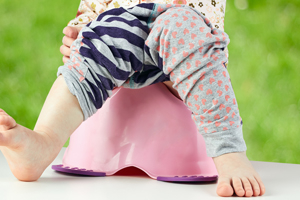Potty Training Advice for Parents: It’s Not Your Fault
New book by Rutgers pediatric urologist applies a decade of research to a seldom studied childhood milestone

'I wanted to be able to give parents better answers other than what I thought was right based on my personal experience, and there haven’t been a lot of good scientific articles on toilet training over the last 50 years'– Joseph Barone, chief of pediatric urology at Rutgers Robert Wood Johnson Medical School
Ever since Dr. Spock published his first book on baby and child care in the 1940s, the best approach to potty training has been a matter of debate. Should parents decide when it’s time to start? Or should they wait until their child shows an interest in using the toilet?
For most other major developmental milestones, an extensive body of research exists to help guide parents and pediatricians through those early years of life. But that hasn’t been the case with potty training – one of the most fraught challenges all parents face.
The lack of scientific literature inspired Joseph Barone, chief of pediatric urology at Rutgers Robert Wood Johnson Medical School, to spend much of his career trying to find definitive answers. He has recently written a book based on a decade of research that was published this month by Rutgers University Press. It’s Not Your Fault: Strategies for Solving Toilet Training and Bedwetting Problems tackles the most common questions Barone has heard from parents over the years while offering advice on how to address bedwetting and other issues.
“I wanted to be able to give parents better answers other than what I thought was right based on my personal experience, and there haven’t been a lot of good scientific articles on toilet training over the last 50 years,’’ Barone said.
“This topic is a really important developmental milestone but it’s been neglected by physicians,’’ he said.
Barone conducted a series of two-year studies examining the experience of about 150 children. The results of his research have appeared in several academic publications including Pediatrics, the Journal of the American Academy of Pediatrics.
The book fills a void on a complex topic, said Patricia Whitley-Williams, chair of the Department of Pediatrics at Rutgers Robert Wood Johnson Medical School.
“This is a unique resource available in probably one of the most common challenges parents face raising a child and that is the issue of toilet training,’’ Whitley-Williams said.
“The way we practice and educate parents is usually through evidence based medicine, but this was the one area where there has been less research done,’’ she said. “This book was an effort to really put forward more evidence based reporting of what we know about bedwetting and toilet training.’’
Barone’s research tackled the question of whether parents should initiate potty training or wait until their children show signs of being ready – a debate that had been sparked by the publication of Dr. Spock’s first book in 1946.
The approach parents took didn’t matter, Barone found. Instead, the most important factor was not how, but when, children were toilet trained. Toddlers younger than 27 months are not developmentally ready, but waiting longer than 32 months to start potty training can lead to additional challenges because children are old enough to know they can resist.

“Parents to come to me with children ages 3-8 who have never learned to fully potty train and they ask ‘did I do something wrong?’ ‘Did I use the wrong toilet training method?’ Barone said.
“What parents need to know is it doesn’t matter what method you use, it’s more important that you just do it,’’ he said. “I don’t’ recommend waiting until the child is ready. I recommend toilet training between 27 and 32 months.’’
Other new findings reported in the book include evidence that at least three months of breastfeeding, which promotes faster development of a child’s nervous system, can prevent potty training problems down the road.
Barone also advises parents not to wait too long to seek medical help if their children develop a bedwetting problem that persists past the age of 6 or 7, or are still wetting themselves during the day past the age of 5 or 6. He said there is no reason for children to miss out on sleepovers or camp for a problem that can be solved with the appropriate help.
“If your child does have a problem or is still having problems it’s not your fault,’’ Barone said. “There are a certain group of kids that are not perfectly toilet trained because their nervous system is not fully developed.’’
“It’s very common for parents to wait and wait for a child to outgrow bedwetting,’’ he said, “but if you wait too long it becomes a very stubborn problem and sometimes it’s more difficult to treat in older kids.’’
Barone is hoping his book can become a go-to resource for parents.
“When I started looking into it 10-15 years ago, it was confusing because there was so much anecdotal information out there,’’ Barone said. “I’m trying to make it less confusing for parents and boil it down to something simple.’’